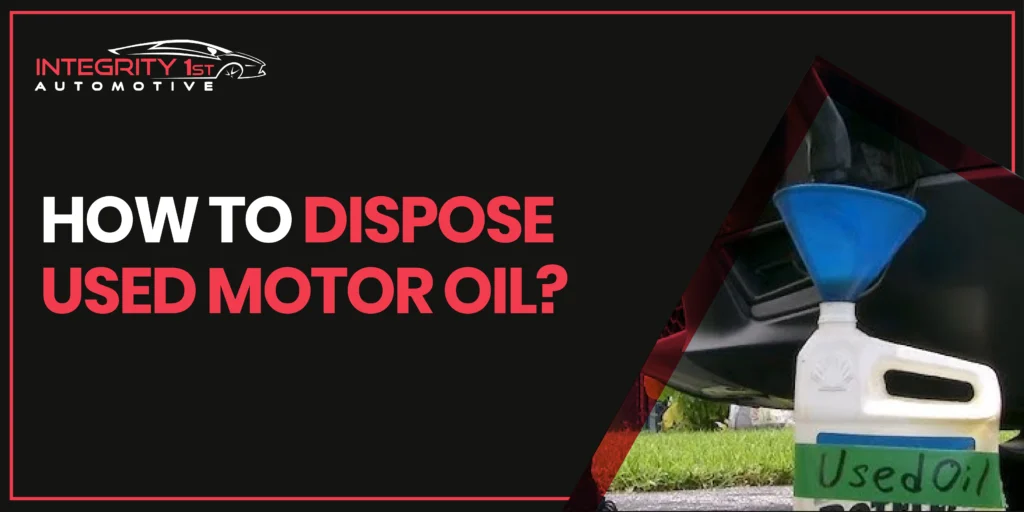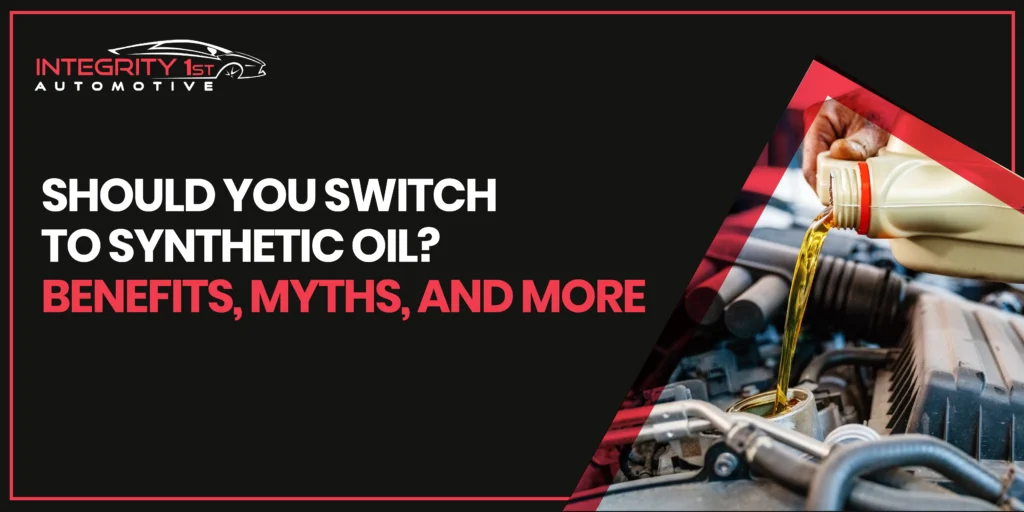Are you tired of frequent oil changes and sometimes wonder, “Why my engine oil gets dirty fast?”
Imagine you’re taking your car for frequent oil changes, but still your engine oil seems to get dirty rapidly! This situation can be too overwhelming for car owners. Whether you own a classic Toyota or a modern SUV, the engine oil losing clarity faster than ever can be a frustrating experience.
No matter if you’re a seasoned DIY mechanic or a casual driver, understanding the factors that contribute to rapid oil degradation is crucial. In this article, we’ll delve into the common causes of premature oil darkening, including:
- Insufficient Oil Drainage
- Low-Quality Fuel
- Short Driving Cycles
- Oil leaks
- Carbon Buildup
You’ll also get practical tips that help you maintain optimal engine health and extend the life of your oil.
Stay with us!
Dirty Engine Oil Symptoms
If your engine oil is dirty or degraded, many engine problems may arise. Here’s how to check for dirty oil.
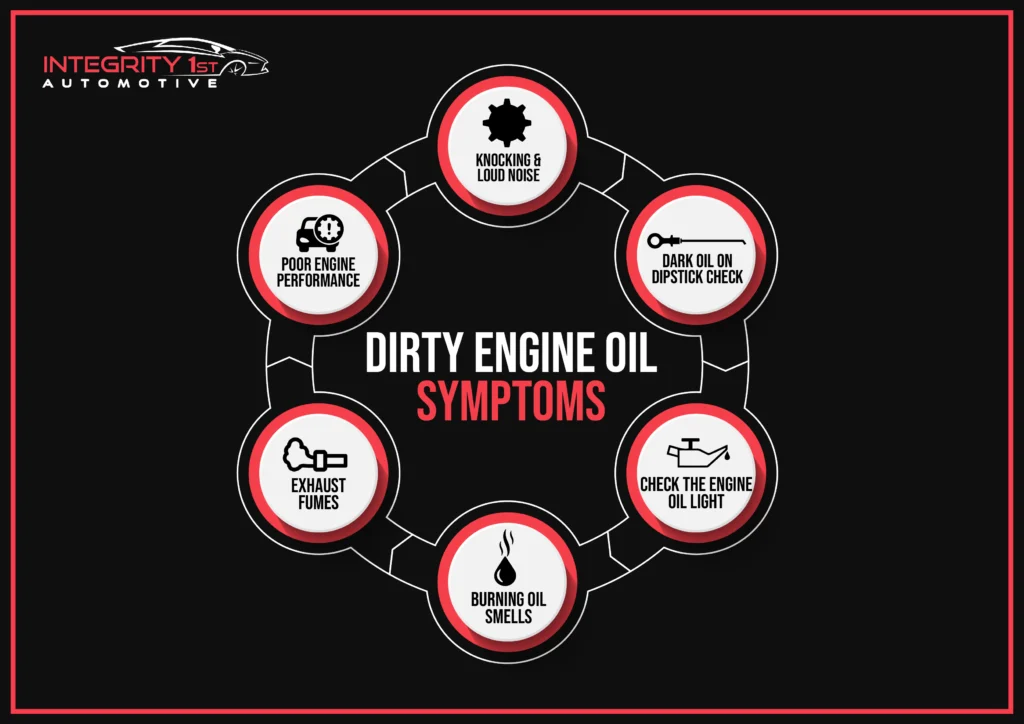
Knocking & Loud Noise
One of the most common signs of dirty engine oil is a pinging or knocking sound that comes directly from your engine. It’s due to insufficient lubrication, leading to metal-on-metal contact and making disturbing noises.
Dark Oil on Dipstick Check
A simple dipstick check can reveal the overall health of your engine oil, as the engine oil color can indicate whether it’s contaminated or still in good condition. Healthy engine oil is usually amber in color. However, contaminated or dirty engine oil is usually dark brown, black, or sludgy.
Check the Engine Oil Light
Always keep an eye on your vehicle’s dashboard for a warning light for low oil pressure. If the oil light keeps coming on, know that your engine oil is too low or too dirty to provide optimal lubrication to your engine.
Burning Oil Smells
If a strong, pungent, and burning, oil smell comes from your engine compartment, it’s a red flag!
It usually indicates that your oil is too hot, leading to oxidation and degradation.
Exhaust Fumes
If you notice unusual fumes or excessive smoke from your exhaust, it can be a sign of dirty oil. Exhaust fumes can be caused by oil burning off, ultimately harming your engine and the environment.
Poor Engine Performance
One of the major signs of dirty oil is poor engine performance, which may lead to decreased power, sluggish acceleration, and reduced fuel efficiency. If your vehicle suddenly shows signs of poor performance, it’s always best to check the oil.
What Causes Engine Oil To Get Dirty?
Like every other component, engine oil can become contaminated and dirty over time, losing its effectiveness. This prevents the oil from performing its functions properly, i.e., lubricating and cooling your engine’s moving parts.
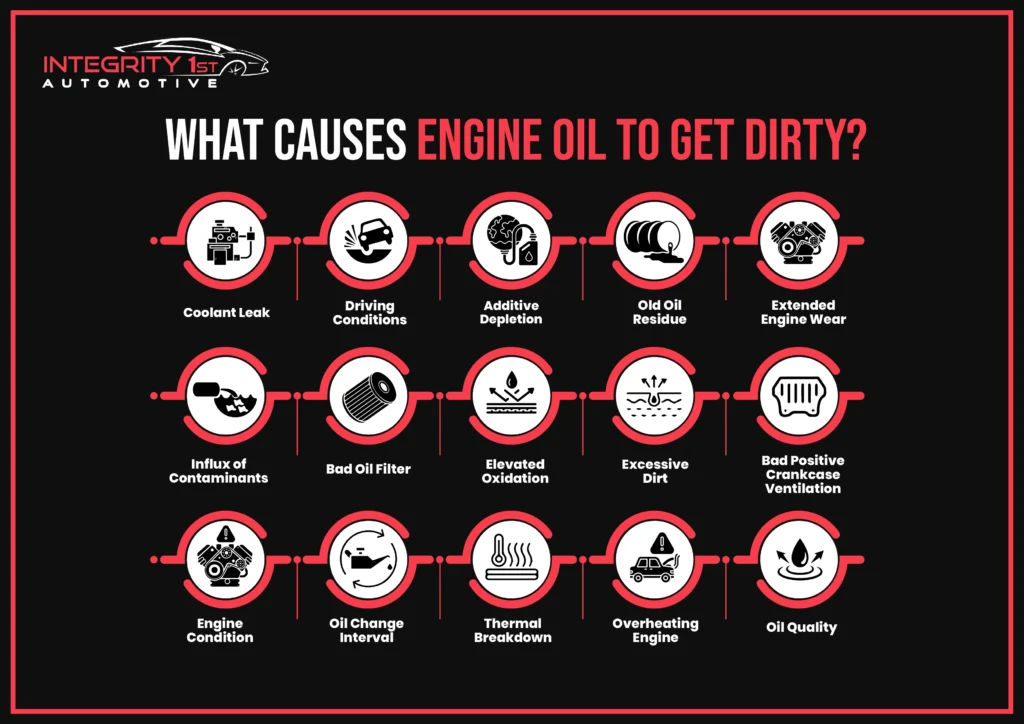
Coolant Leak
If your coolant is leaking, it will eventually mix with the engine oil, resulting in a sludge-like substance that can clog your engine components.
Driving Conditions
The health of your engine oil also depends on your driving conditions. For example, taking frequent short trips, idling, and heavy towing can accelerate oil degradation because of incomplete combustion and increased heat.
Additive Depletion
Throughout the years, the additives in the oil that prevent occasional wear and tear, corrosion, and oxidation can deplete, reducing efficiency and effectiveness.
Old Oil Residue
While changing old oil, it may leave some residue that can mix with the new oil, accelerating its degradation.
Extended Engine Wear
If your engine is old, it may produce more metal particles, contaminating the oil and making it dirty.
Influx of Contaminants
Over time, certain contaminants, including dirt, dust, debris, and metal particles can enter the engine through the air intake and contaminate the engine oil.
Bad Oil Filter
If your oil filter is malfunctioning or not the proper size, it may allow contaminants to pass through and into the engine oil. As a result, it can contaminate even the cleanest and most recent oil change.
Elevated Oxidation
High temperature speeds up the oxidation process and causes the oil to thicken and lose its lubrication properties.
Excessive Dirt
If you drive in dusty, hot, and humid climates, excessive dirt and debris may accumulate in the engine and contaminate the oil, reducing its effectiveness.
Bad Positive Crankcase Ventilation
A bad PCV system allows excessive blow-by gases to enter the crankcase. As a result, the engine oil gets contaminated.
Engine Condition
The condition of your engine plays a vital role in maintaining the health of your engine oil. A poorly maintained engine with worn seals and gaskets usually allows combustion gases to enter the crankcase and contaminate the oil.
Oil Change Interval
It’s important to follow the recommended oil change interval by your manufacturer to avoid oil degradation issues and reduced engine performance.
Thermal Breakdown
High operating temperatures may cause the oil to break down chemically. As a result, the engine oil loses its effectiveness.
Overheating Engine
An overheating engine may cause several oil-related problems, including oil degradation. Therefore, it’s crucial to maintain and repair your engine when needed.
Oil Quality
Using the wrong type of oil or low-quality oil can harm your engine’s performance and cause it to deteriorate faster.
Low-quality engine oil can lead to excessive carbon buildup in your engine. High-mileage engine oils are designed to clean this buildup, but if your car is older and already has accumulated carbon deposits, the oil usually works harder and gets dirtier faster.
To help keep your engine and oil cleaner, consider using the recommended oil type and viscosity as mentioned in your user’s manual or as recommended by your mechanic.
Why Does Dirty Oil Matter?
If you’ve been thinking of dodging your up-and-coming oil change and end up asking yourself, “Why does dirty oil even matter?”
This section is for you.
Driving with dirty engine oil can have serious consequences for your vehicle’s health and performance.
First of all, dirty engine oil contributes to engine damage, resulting in premature wear and tear, clogged oil passages, and increased friction.
But worst of all, dirty engine oil corresponds to reduced fuel efficiency, increasing internal engine friction, and inefficient combustion that may lead to many safety concerns, such as engine seizures, and reduced engine power.
Preventive Tips for Cleaner Engine Oil
If you struggle with keeping your engine oil clean before your recommended oil change interval, good news!
Here are some practical tips you can follow to keep your engine oil clean and your engine running smoothly.
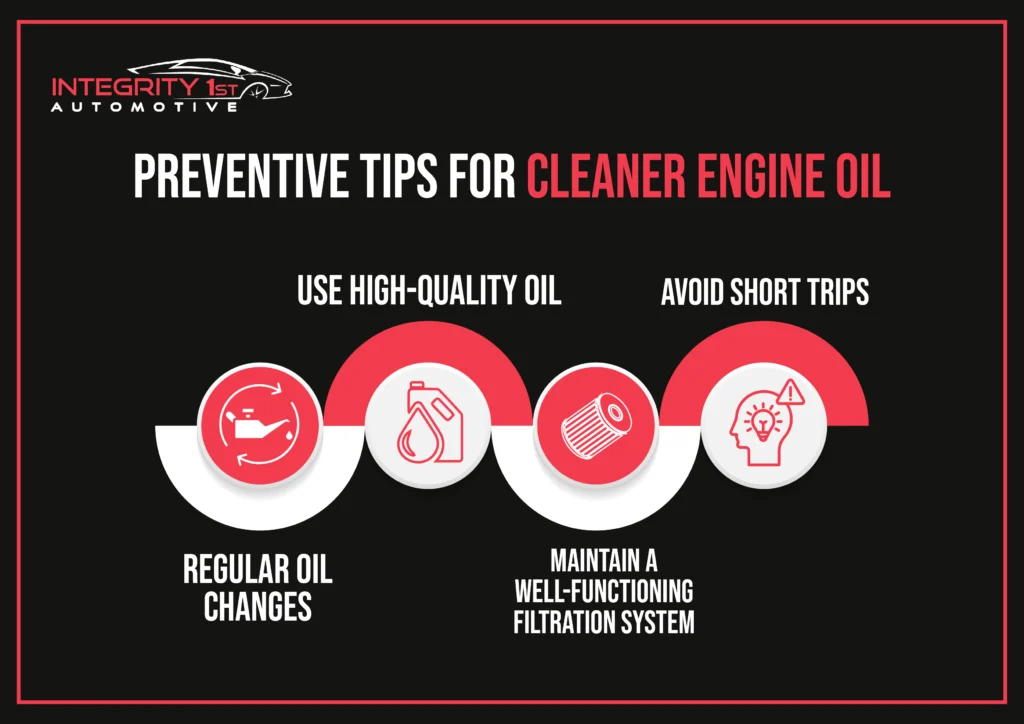
Regular Oil Changes
Strictly adhere to the recommended oil change intervals mentioned in your user’s manual. However, if you drive in harsh conditions with extreme temperature extremes, consider more frequent oil changes.
Use High-Quality Oil
Always choose premium engine oil that exceeds your vehicle’s requirements. If you are particular about your vehicle’s performance and longevity, consider synthetic oil.
Maintain a Well-Functioning Filtration System
After each oil change, make sure you replace the oil filters and remove the contaminants. Also, keep checking your air filters as clean air filters allow dirt and debris to accumulate in the engine and contaminate the oil.
Avoid Short Trips
Go for longer trips to prevent incomplete combustion and increased engine wear. Longer trips allow the engine to warm up and the oil to circulate effectively.
Keep Your Engine Clean with an Integrity 1st Oil Change.
Dirty and contaminated engine oil can pose serious threats to your vehicle’s engine. Therefore, you should regularly check the oil levels with the help of a dipstick and notice the color of your engine oil.
While the oil color is not the only factor that determines you need an oil change, it’s one of the best ways to check the oil’s health. If you want to learn more about what different engine oil colors mean, check out our detailed guide on what color your car oil should be.
Whatever you do, don’t let dirty oil compromise your vehicle’s performance and longevity. At Integrity 1st, you can request comprehensive oil change services to keep your engine running smoothly.
The expert technicians at Integrity 1st Automotive will:
- Drain and replace old oil to thoroughly remove old, dirty oil.
- Install a new oil filter to ensure maximum filtration and contaminant removal.
- Inspect vital components to check for any potential issues that may affect your vehicle’s performance.
- Top off fluids and maintain proper fluid levels to keep your engine running efficiently
Schedule your oil change and get guaranteed results with Integrity 1st Automotive today!
Final Thoughts
Now that you finally know the factors that contribute to dirty engine oil, it’s easier to implement those preventive measures to improve your vehicle’s performance and longevity.
Some of the best ways you can prevent premature wear and tear and degraded oil are regular oil changes, high-quality engine oil, and proper maintenance of your vehicle to keep the engine running smoothly.
However, if you’re still worried about the health of your engine or have no idea how to do regular oil changes, consult with an expert mechanic or technicians at Integrity 1st Automation to ensure your vehicle’s superior performance.


